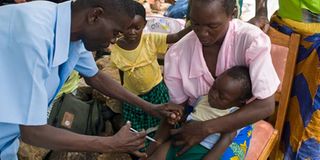Decline in global malaria deaths-new report shows

A health worker immunises a child. The new WHO report shows malaria still affects many children under the age of five. file photo
Global efforts to control and eliminate malaria have saved an estimated 3.3 million lives since 2000, mostly in Sub Saharan Africa where the disease is endemic, the world malaria report shows. The 2013 report by the World Health Organisation (WHO) reveals malaria mortality rates reduced by 49 per cent in Africa alone.
“The large majority of the 3.3 million lives saved between 2000 and 2012 were in the 10 countries with the highest malaria burden, and among children aged less than five years – the group most affected by the disease,” says a statement by WHO.
“This remarkable progress is no cause for complacency. Absolute numbers of malaria cases and deaths are not going down as fast as they could,” says Dr Margaret Chan, WHO Director-General.
She adds: “The fact that so many people are infected and dying from mosquito bites is one of the greatest tragedies of the 21st century.” WHO figures show in 2012, there were an estimated 207 million cases of malaria which caused approximately 627 000 deaths.
Long way ahead
The new WHO report notes a slowdown in the expansion of interventions to control mosquitoes for the second successive year, particularly in providing access to insecticide-treated bed nets. This has been primarily due to lack of funds.
According to the report, the proportion of population in sub-Saharan Africa with access to an insecticide-treated bed net remained under 50 per cent.
Only 70 million new bed nets were delivered to malaria-endemic countries in 2012, below the 150 million minimum needed every year to ensure everyone at risk is protected.
WHO says access to artemisinin-based combination therapies (ACTs) to treat malaria is on the increase, although millions of people continue to lack access to diagnosis and quality-assured treatment, particularly in countries with weak health systems.
“To win the fight against malaria, we must get the means to prevent and treat the disease to every family who needs it,” says Raymond Chambers, the United Nations Secretary General’s Special Envoy for Malaria.
“Our collective efforts are not only ending the needless suffering of millions, but are helping families thrive and adding billions of dollars to economies that nations can use in other ways,” he adds.




